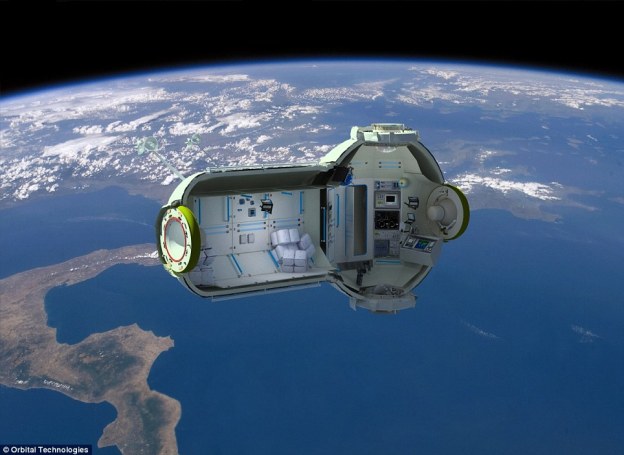 We’ve been reporting quite a bit lately on NASA’s support of private-sector space travel, but the U.S. space agency isn’t the only one envisioning a commercial future in the stars. How about spending a weekend in a Russian space hotel?
We’ve been reporting quite a bit lately on NASA’s support of private-sector space travel, but the U.S. space agency isn’t the only one envisioning a commercial future in the stars. How about spending a weekend in a Russian space hotel?
A Russian company called Orbital Technologies recently announced plans to build a hotel 217 miles above the Earth, capable of housing seven guests in four cabins. Given its location, there’s a good chance the view would be, well… out of this world.
(Our apologies for that last line… we couldn’t stop ourselves.)
Before you start packing your bags, though, you might want to check your bank account. A five-day stay at the hotel is expected to cost around $942,000, with room and board priced at about $157,000 and the two-day flight to get there (aboard a Soyuz rocket) costing $785,000.
The Commercial Space Station (as it’s officially being called), is expected to open for business by 2016, but don’t let it’s name fool you — this won’t be the cramped, no-frills environment of the International Space Station.
“Our planned module inside will not remind you of the International Space Station. A hotel should be comfortable inside, and it will be possible to look at the Earth through large portholes,” said Sergei Kostenko, chief executive of Orbital Technologies in the official announcement of the project. “The hotel will be aimed at wealthy individuals and people working for private companies who want to do research in space.”
Among the amenities provided to guests will be horizontal or vertical sleeping arrangements, sealed-off showers (ISS astronauts and cosmonauts rely on sponge baths during their missions), and fine food that’s prepared on Earth, then sent up on the rocket to be reheated.
No, there won’t be any freeze-dried tubes of of paste for Commercial Space Station guests. The hotel’s guests will instead dine on braised veal cheeks with mushrooms, white bean puree and plum compote.
Oh, and to avoid any nasty incidents, alcohol will be strictly prohibited in the space hotel, and visitors will be accompanied by an experienced crew.
You can see more images of the Commercial Space Station at The Daily Mail.
Editors' Recommendations
- SpaceX Dragon spacecraft completes final mission ahead of crewed launch
- How to keep astronauts sane: The psychology of long-duration space missions
- Crops in space: ISS-grown lettuce given the green light
- Boeing acknowledges 49 ‘gaps in testing’ in NASA Starliner test flight failure
- How to watch SpaceX launch its 20th resupply mission to the ISS today




